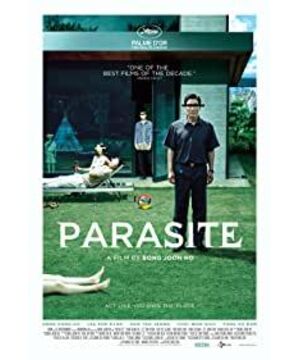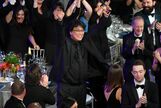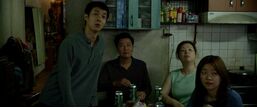King of Death: How difficult is it for Chinese fans to watch the new Palme d’Or movies? Looking back at the end of July, the FIRST Youth Film Festival cancelled the screening of "Parasite", which was originally scheduled to be the closing film due to "technical reasons"; and in early August, the major domestic subtitle groups received notices from copyright owners, prohibiting the dissemination of pirated resources and Provide subtitles for "Parasite". Therefore, when the overseas streaming media finally officially released the entire film of "Parasite" on August 6, the Chinese fans collectively experienced a very magical day.
Regarding the topic of piracy, which has been discussed for many years, the old saying is repeated, "We are also willing to pay for the original version, but there is no way to start." Presumably fans also hope that one day they can see "Parasite" in It will be released in China, and I believe that many people will go to the cinema to go to the cinema for two and three times!
Author | Huang Moyu
After experiencing the "prosaic" of "Snow Country Train" and "Yuzi", Feng Junhao finally ushered in 2019, a year destined to be extraordinary for him. With "Parasite", the 49-year-old Bong Joon-ho won the Palme d'Or at the 72nd Cannes International Film Festival, which was also the first Palme d'Or award for Korean films. The score of 3.7 and the "Palladium approved by all members" as called by the chairman of the judges Gonzalez, gave "Parasite" a dazzling aura.
Obviously, Feng Junhao has fully demonstrated his talent in this new work, creating an "architecture"-style image while also writing a "sociological essay".
I particularly like a line in the movie: "He always touches the bottom line, but never breaks." Feng Junhao also did the same to the audience, except for the multiple reversals in the narrative, in the genre tone of the popular drama I have also tried many changes. Start with family trivial matters to set the tone of popular drama. The whole process from "infiltrating" the rich family to completely "parasitic" is filled with a lot of cold humor and stage-style scheduling, exuding the charm of black comedy.
When the key event broke out, the overall style of the film changed greatly, the overall scene became darker, and the rhythm of the soundtrack editing became faster. It was also accompanied by the continuous addition of "emergency events", which gave the film a strong suspense and horror.片色。 The color. It is worth mentioning that Feng Junhao's conversion of these types is not through text footnotes, but a subtle grasp of the image itself.
1. The construction of "architecture" images
Taking the image as the priority is obviously Feng Junhao's primary purpose when creating this film. The first lift shot at the opening uses a slightly upward window to exquisitely express the sense of distance from the "ground". Inside the mansion, Feng Junhao cleverly uses the distance between the two large stairs, the kitchen and the living room, and the grass outside the floor-to-ceiling windows to divide the indoor space in an orderly manner.
The poor and the rich are placed in different neat spaces under different circumstances. The characters and the space are harmonious from a single point of view, but once the contact between the different areas occurs, it will be very visually abrupt. feel. Feng Junhao uses the angle and size difference of different spaces to create "up and down" shots of different characters with relational meaning. No matter which party is gaining momentum, it seems that it is difficult for them to be on the same plane. .
The stairs going up from the living room are even more important, and they themselves have the meaning of "ascending passage". On this basis, Feng Junhao has arranged many times for members of poor families to rely on the stairs, hiding them from the line of sight of the opposing character through the occlusion of the stairs, which is quite "parasitic". Controlled by simple character variables alone creates a complicated mutual deception relationship between multiple groups of characters.
This scene is also connected to the living room in composition. The two walls inside and outside divide the screen into three neat spaces with similar shapes from high to low, and a pillar acts as the central axis of the screen to make the screen symmetrical. The “full” and “empty” on the left and right form a sharp contrast. With the objects in the foreground of the living room, while squeezing the picture to the extreme to mobilize the atmosphere, it also highlights the neat and scattered beauty of the space, as if it is a modern style. Mosaic painting.
At the same time, the division of the interior space also gives the invisible part a great imagination. The dark parts such as the end of the staircase and the entrance are harmoniously present in the overall neat space as unstable factors, just like parasites. When these invisible spaces are revealed in the second half, the strong visual contrast brought by them can be said to directly serve the typological change in the second half.
The two Drama Time images were also excellent. The first time was an important turning point for the whole film: under the melody of classical music, close-ups and panoramic views were combined in an orderly manner to create a strong visual contrast. The efficient connection between the mirror and the panning mirror enhances the dynamic and tension of the mirror movement, while strongly emphasizing the action of the main character. The upper and lower crosses are disorderly, but the parallel movement of several groups of characters seems to be dancing on the same stage. When the melody fell, the most offensive action was chosen to end the melody at the quietest moment. After a clean muffled sound, the dance music quietly ended in silent creep.
The second rainy night was even more exciting. People were flooded, but Feng Junhao only let us see the bugs scattered and fleeing. He didn't use close-ups to show the facial expressions of the characters, but chose the big perspective as a starting point. In the night when there was only the sound of rain, he witnessed the small three people fleeing in a hurry. With the rising and falling camera, the characters continued to descend in the sound of rain. Following the ill water under their feet, they returned home, and the climax had just begun. What started from this was the struggle between insects: "You go down and I go down, I vomit, and it spurts from your high position. , I dropped it, you bear it."
Feng Junhao continued to use the angle, position difference and similarities in the small indoor space to smoothly cut the two groups of characters in the two parallel spaces on the same timeline, and formed a strong sense of alignment. They antagonized each other, but suffered the same way. No one was aware of each other’s suffering, but they were all concerned about "self-saving". This neglect is doomed to the end, and the close-up of that "crazy stone" is used as a close-up. It is not appropriate, if there is no reflection after the suffering, then there is only revenge.
II · Writing of "Sociology" Essays
Under the enjoyment-level video, Feng Junhao continues to stick to his expertise and write sociological essays. Unlike the silent anger of Burning, Parasite is obviously a truly "cold class stone."
Looking at the three groups of characters in "Parasite", one group is a poor family headed by Song Kanghao, the other is a rich family headed by Li Shan, and the rest is an old housekeeper who is a vassal of the rich. The small social ecology formed between these three groups of characters is like a social experiment. Feng Junhao continues to control the variables, and through the three groups of characters’ different understandings of the two concepts of "smart" and "emotion", to show class Differences and problems between.
The first is "smart", which is almost always a noun emphasized throughout the film. The entire "parasitic" process is essentially a kind of game and fraud, which also means that there will be a difference in decision-making between the two sides, which is clearly shown on the surface of the movie. Uncle Kang’s family worked out one after another, exhausted their cleverness, and eventually made the whole family succeed. Indeed, the poor family is very smart, and even Uncle Kang’s wife can’t help feeling that the rich are stupid and “good”.
But looking back at the whole process, what did the rich lose? Nothing is lost, they still lead a high-quality life, occupy the upper-class social status, and control the lower-class. Even the clever Uncle Kang's family, the final success is still just below the rich? The rich are indeed innocent and even a little dull, but the smartest poor people are still just below them. From this perspective, the rich are clearly smarter than them. The level of intelligence of the rich is much higher. Their intelligence lies in that they build and control the social structure and rules. No matter how smart the poor are, they will eventually operate under the rules of the game set by the rich.
The dullness and simplicity of the rich are the privileges granted to them by their intelligence. The rules formulated by the rich doomed them to not need too much "wisdom" to deal with the things in life, because the system has long been done once and for all. They don't have to worry about the so-called "poor people turning over", you can't "turn over". Because under this strict system, you can't receive the so-called "turning over" education, and you can't even think of going to "turn over".
And the housekeepers who are vassals of the rich are also smart, but they are clever in how to loyal to the rich. Unlike the Kang Shu family’s strong fraudulent profit-making, the housekeepers are truly grateful for the blessings from the rich. To stay forever to serve it. They are a group of people who deify the rich, and through continuous allegiance to satisfy their own food and clothing, they even finally reach the position of the middle class. They try their best to use their intelligence to meet the high demands and strict standards of the rich, and exchange their intelligence for "bread."
When the butler as a vassal encounters Uncle Kang's family as a "parasite", he uses middle-class language and attitude to taunt Uncle Kang's family. Confrontation with "indecent". It can be said that this is a special group of people who speak "upper sentences" but eat "indecent food". Their intelligence is only an aid or continuation of the rich people's intelligence. This group of people will always be restrained until they are killed violently. In the "smart" middle class dream. And the countless "XX Business Success Studies" series of books in China have been published frequently. Now thinking about it, it seems to be similar to "Parasite".
And "emotion" is a concept hidden in the whole film. It can be summarized as a person's reaction when encountering external events. The poor and the rich have very different degrees of emotionality in the face of external events.
The first is the rich. Throughout the film, the rich appear to be de-emotional and indifferent, whether it is the communication between their family members or the polite and indifferent attitude towards the poor, even in the face. For emergencies and extreme situations, they still remain decent and rational to a large extent. We can hardly see the rich expressing excessive emotions in movies. Facing any problems, it is their habit to be indifferent, decent, calm, and not to be distracted. This is their class "smell".
The poor, it can be said that they show their emotions without shying away from it. Sitting with their families, they begin to sigh and complain. The youngest son quickly falls in love with the rich girl who is counseling, and their whole family is sensitive to the word "smell". We see public happiness, anger, sorrow, and joy in this family. It seems that apart from parasitic fraud, they no longer have anything to hide. In the face of external events, they subconsciously show their truest attitudes and reactions. This is also true. Their unique "smell".
In fact, the stark difference in emotion between the poor and the rich has been paved from the painting. The youngest son said that his intuitive feeling "is it a gorilla," but the lady thoughtfully said that it was a self-portrait. For a messy thing, the rich choose to use "artistic psychology" to answer, while the poor choose to express their opinions directly. These are already two different ways of thinking in long-term different lives.
While the difference in emotion is manifested in the different "scents" of the two classes, emotion also largely dominates the consciousness of the poor. First of all, I have to mention that, in fact, the bad guys feel that "each class has a place where each class should stay" is completely reasonable. Instead, they feel that the same bad guys have overstocked their lives. space. It is obvious from the confrontation between the housekeeper's family and Uncle Kang's family that this is the prerequisite for all their actions. This is doomed, and they will never try to resist the system itself.
But why did Song Kanghao kill Lee Sun Kyun in the end? Obviously because the boss did two things: 1. Give money to Uncle Kang to act as an Indian. 2. Turn the murderer over and take the key. 3. Pinch the nose.
In the first incident, Uncle Kang has already begun to be dissatisfied. The confrontation between the Indians and the American Boy Scouts is undoubtedly a kind of "prey" humiliation for Uncle Kang, but Li Shanjun only wants to solve it with money. In the second incident, Uncle Kang was angered. When the danger occurred, he saw that the rich were only protecting themselves, and Uncle Kang had begun to condemn him from the moral level. And the third thing was the last straw that crushed the camel: pinching his nose.
This goes back to the "smell" that the film has always said. Although the Kang family has been trying to eliminate the smell, they themselves don't have much attitude towards the smell, just to avoid trouble. At this moment, Uncle Kang’s tolerance for "smell" is at its extreme. Even if "smell" is just a trivial matter in Uncle Kang's eyes, even at extreme moments, the rich will still pay special attention to the so-called "smell" on your body. In the face of life and death, there is still a difference between the poor and the rich. Since then, Uncle Kang’s emotions have completely exploded. He was completely irritated from the perspective of morality and his own dignity. move.
But the problem is that his outburst is still an unbearable emotional behavior, rather than a real thought change. Maybe at that moment, he thought that "the rich are all bastards", but when he returned to the basement, he still "repented" and "thank you for favors", and everything continued to reincarnate. The so-called changes and resistances are nothing but an emotional flash in the pan. They are not the result of thinking and education. Therefore, the order will not be shaken. No matter how bloody incidents are, in the end, they will be nothing more than after-dinner talks by the news media.
When the lower level is as comfortable as the upper level, they only ponder the horizontal struggle for survival of the same kind, but never look up at the vertical mountain. Every accident is just a moment of emotion. In the end, we must be grateful for the grace. The consciousness awakening that the poor people need most is not available because of the education of their own class.
When "want to get rid of the odor" becomes the source of the odor, the odor is no longer just a gas, but a stone, always following the cold stone behind the downfall. The lower-class people always have only emotions, and the upper-class people don’t even need to deliberately "discriminate" or "behave". Being decent and stable is already the biggest humiliation to the lower-class.
3. Regretful "dead end"
Under Feng Junhao's social experiment, the social structure has become a "dead end". Using the simulated social ecology, Feng Junhao wants to express this terrifying reality: integrating into and surviving in society, relying on the powerful and squeezing the living space of the same class, that is, contemporary class consolidation.
But obviously, the social ecology simulated by Feng Junhao still has major limitations. The essence of simulation is established on the basis of stereotyped characters with excessively heavy design traces, and many strong reversals of narratives eventually appear to be too heavy for commercial attributes and spectacle attributes. The most fundamental problem is that although Feng Junhao examines "social reality" with a thinking and reflective attitude, his works ignore the reproduction of the true and comprehensive social system, and merely use the epitome of a rich family. The general system of generalization seems to be overly allegorical and weakened in reality.
As for the social class problem he is thinking about, Feng Junhao only shows the tragic reality, but he does not have his own solution, or the deduction of the possibility of actual resistance. His eyes remain on the surface of observation and summary, lacking feedback from it.
And the class problem that Bong Joon-ho is thinking about, how far is it from the real class problem in Korea? Is it possible to use the artistic form of film to deduce and try to solve social problems naturally, instead of becoming a spectacle? This is an important question that all filmmakers must continue to think about. After Palme d'Or and another tens of millions of masterpieces, Korean movies still have a long way to go.
Author | Huang Moyu; Official Account | Seeing Death in Movies
Edit | Riding a Rooftop Boy; please indicate the source for reprinting
View more about Parasite reviews











